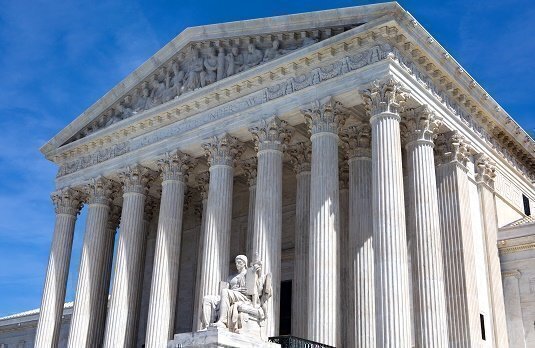The United States Supreme Court starts its new 2017 term on Monday, and significant cases are coming into focus as the Justices consider gerrymandering, religious freedom, voter registration, public unions, and cellphone privacy as issues.
 A case about President Donald Trump’s immigration executive orders was pulled from the case docket as the Court wants to see briefs from attorneys about its viability.
A case about President Donald Trump’s immigration executive orders was pulled from the case docket as the Court wants to see briefs from attorneys about its viability.
Link: Related Podcast on Must-Watched Cases
Among the five major cases, only two have dates set for arguments. On Tuesday, October 3, the nine Justices will consider Gill v. Whitford. In this case, the Court will ponder the subject of redrawing political districts to benefit candidates from a political party. Wisconsin is appealing a ruling that struck down a redistricting map created after the 2010 census. The issue to watch: Can the Supreme Court devise a formula to reduce or eliminate partisan gerrymandering?
On November 8, the Court will consider the issue of purging voter registration lists. In Husted v. A. Philip Randolph Institute, the Justices will look at an apparent conflict between federal voting statutes and state-based programs to maintain voter registration lists. Ohio's program removes voters from its list of registered voters if they don't respond to a notification after four years and vote again. Critics say federal law prevents states from removing people from voter registration rolls for not voting.
Two other cases could get court dates for later in November or possibly December.
In Carpenter v. United States, the Court will consider if the warrantless seizure and search of historical cell-phone records, which show the location and movements of a cell-phone user over a period of more than four months, is permitted by the Fourth Amendment.
And in Masterpiece Cakeshop, Ltd. v. Colorado Civil Rights Commission, the Justices will decide if Colorado's public accommodations law violated the First Amendment religious rights of a cake maker who declined to make a cake for a same-sex marriage event.
Another major case was added to the Court’s docket on Thursday and most likely will be heard in 2018. In Janus v. American Federation, the Court will again tackle the issue of compelled financial support for public unions, and if public employees can be forced to pay dues to unions they don’t belong to as an effort to offset contract-negotiation costs. In 1977, the Court said unions could charge such fees, but recent doubts have emerged from some Justices that the practice can continue.
Scott Bomboy is the editor in chief of the National Constitution Center.







